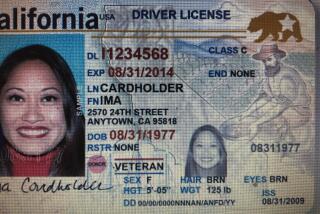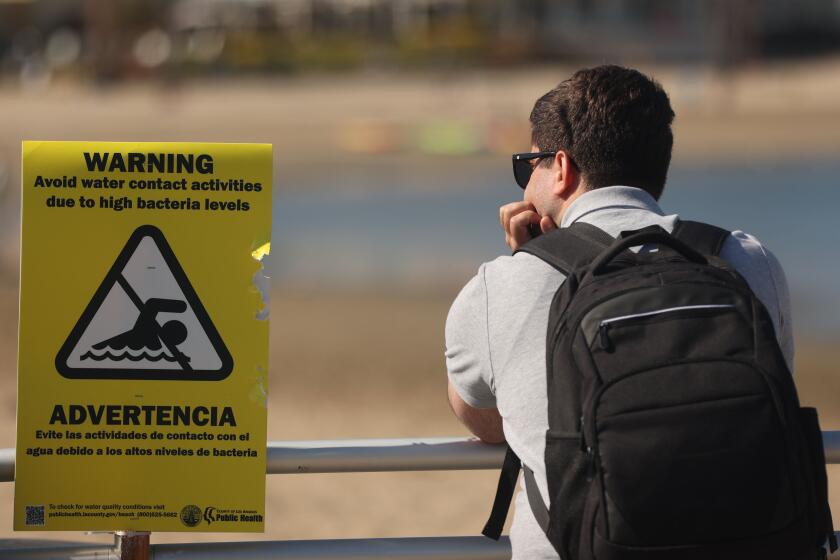Hall Leading Alarcon in 7th Council District
Retired fire captain Lyle Hall, making his second run for the Los Angeles City Council seat representing the northeast San Fernando Valley, appeared headed for victory in early returns from Tuesday’s election.
Hall, 53, held a wide lead in absentee ballots over former mayoral aide Richard Alarcon, who if elected would be the first Latino to win a Valley seat on the council. They contested the 7th District seat being vacated by Councilman Ernani Bernardi, 81, who retires this month.
A 31-year Fire Department veteran decorated for heroism, Hall forced Bernardi into a runoff in 1989 but lost. Throughout this year’s race he was widely viewed as a sort of unofficial incumbent, attracting campaign donations from many City Hall lobbyists and other special interests.
Soft-spoken and affable, Hall repeatedly emphasized his years spent protecting lives and property in the district, where until recently he commanded the Mission Hills fire station. He fended off Alarcon’s charges that he was a newcomer bankrolled by the City Hall Establishment.
Alarcon, 39, formerly Mayor Tom Bradley’s top Valley aide, sought to portray himself as a home-grown product and grass-roots champion of the district, enlisting many politically inexperienced volunteers to help his campaign, including a corps of young Latinos.
Alarcon stressed his deep roots in the northeast Valley, telling voters at every opportunity of his years of playing Little League baseball, teaching school and being a community activist there. In one campaign brochure, he listed nearly 30 local civic groups he has been involved with.
Both Hall and Alarcon are moderate to liberal Democrats who are in broad agreement on many issues. As a result, their runoff race in its early stages was remarkably well-mannered and issue-oriented.
But as Election Day neared, that high tone deteriorated as the two men began exchanging potshots over who has done the most to improve the heavily Latino district, which stretches from Van Nuys to Sylmar.
“It was not a gentleman’s campaign,” said Hall, as about 100 supporters spilled out of his cramped Sun Valley headquarters and into a parking lot. “There was not much disagreement on the facts. It became personal attacks.”
Hall and Alarcon won runoff berths after placing first and second, respectively, in the April 20 primary election. Hall finished No. 1 despite an unexpectedly weak fund-raising effort. A former president of the city firefighters union, he drew many early donations from his fellow firefighters and unionists.
But after he won the primary, his campaign coffers swelled with contributions from a Who’s Who of City Hall lobbyists, developers, unionists and other special interests.
Plagued by anemic fund raising, Alarcon managed to stay abreast of Hall in campaign spending by going heavily into debt. His campaign showed nearly $40,000 in unpaid bills as of June 2. The two candidates had spent about $95,000 apiece on their campaigns by that date.
Alarcon tried to capitalize on Hall’s special interest donations, sending voters brochures that called the election “a choice between the City Hall Insiders and the Valley’s neighborhoods.”
Hall shrugged off that charge, saying he was nobody’s pawn and arguing that lobbyists and others simply wanted to get on board with a winner.
Hall also swept most major endorsements in the race, collecting plugs from numerous Democratic and Republican politicians, as well as from the Los Angeles Police Protective League and the Howard Jarvis Taxpayers Assn.
Among his endorsers was Rep. Howard L. Berman (D-Panorama City), a leader of the politically influential Waxman-Berman organization, a loose-knit group of liberal politicians rooted in Los Angeles’ Westside who have funneled money and campaign expertise to allies throughout California.
Berman’s endorsement prompted Alarcon to complain that Hall was a pawn of “machine politics” and that the congressman was trying to “prevent the community from having real control over its destiny.”
But Alarcon conceded that he, too, had sought Berman’s blessing.
Hall also picked up the endorsements of all five candidates defeated in the seven-person primary, including Sylmar attorney and ex-Bernardi aide Ray Magana.
Alarcon attacked Magana in the primary’s closing days following disclosures in The Times that Magana had falsely stated he was born in California on a voter registration affidavit, when actually he was born in Mexico. Magana, who led the primary candidates in fund raising, finished fourth and was knocked out of the race.
The last-minute hit angered Magana, who walked precincts for Hall and signed letters sent to Latino voters attacking Alarcon for “running a smear campaign” against both Magana and Hall.
An Anglo running in a heavily minority district, Hall repeatedly said that ethnicity should play no role in the campaign. The district’s population is nearly 80% Latino and African-American, but nearly half of its 50,000 registered voters are Anglos.
Hall found himself the victim of a racial smear when an Alarcon campaigner acknowledged that he had falsely spread word among African-American voters that Hall was a member of the Ku Klux Klan.
Worried about possible political damage, Hall’s campaign publicly named the Alarcon worker at fault. Also, just three days before the election, Hall supporters staged a “People of Color for Lyle Hall” rally to underscore his minority support.
Alarcon also attacked Hall as a “double-dipper,” pointing out that, if elected, Hall would earn a $90,000-a-year councilman’s salary on top of his $50,000-a-year firefighter pension. Hall angrily replied that he had “earned that pension” by years of risking his life.
One Alarcon attack backfired. In a mail brochure, he reprinted a quote from Bernardi saying that if voters elected Hall, they would be “putting the fox in charge of the hen house.” The councilman made the remark during his 1989 battle against Hall.
Bernardi said he had intended to remain neutral in this year’s race. But he was so angered by Alarcon’s use of the quote, which Bernardi said no longer reflected his feelings, that he chastised Alarcon and endorsed Hall.
In council elections elsewhere, former school board member Jackie Goldberg was trailing in early returns in her bid to become the first openly homosexual council member.
In the campaign, the possibility of Goldberg becoming the council’s first openly gay or lesbian member became a bitter, if somewhat peripheral, issue.
During the primary campaign, some leaders of the gay political community criticized Goldberg, a longtime social reformer, for not campaigning aggressively enough as a gay activist. When Goldberg emerged as one of the two top finishers in the primary, most of the gay community coalesced behind her, as demonstrated by the substantial donations from activists that helped power her campaign.
The focus of the general election campaign, though, was on providing basic government services to the 13th District, which sprawls from Hollywood to Glassell Park.
The partial results also showed voters narrowly favoring veteran Harbor Area Councilwoman Joan Milke Flores, who has represented the 15th District for 12 years. The district stretches from Watts to the Harbor area.
Flores, 56, and challenger Rudy Svorinich, a 33-year-old paint store owner and first-time candidate, are Republicans who spent much of the runoff campaign attempting to expand their appeals beyond their mutual home base of San Pedro. The result was that they spent much of their time and energy on the district’s predominantly minority and Democratic areas.
Times staff writers Sharon Bernstein and David Colker contributed to this report.
More to Read
Start your day right
Sign up for Essential California for news, features and recommendations from the L.A. Times and beyond in your inbox six days a week.
You may occasionally receive promotional content from the Los Angeles Times.






